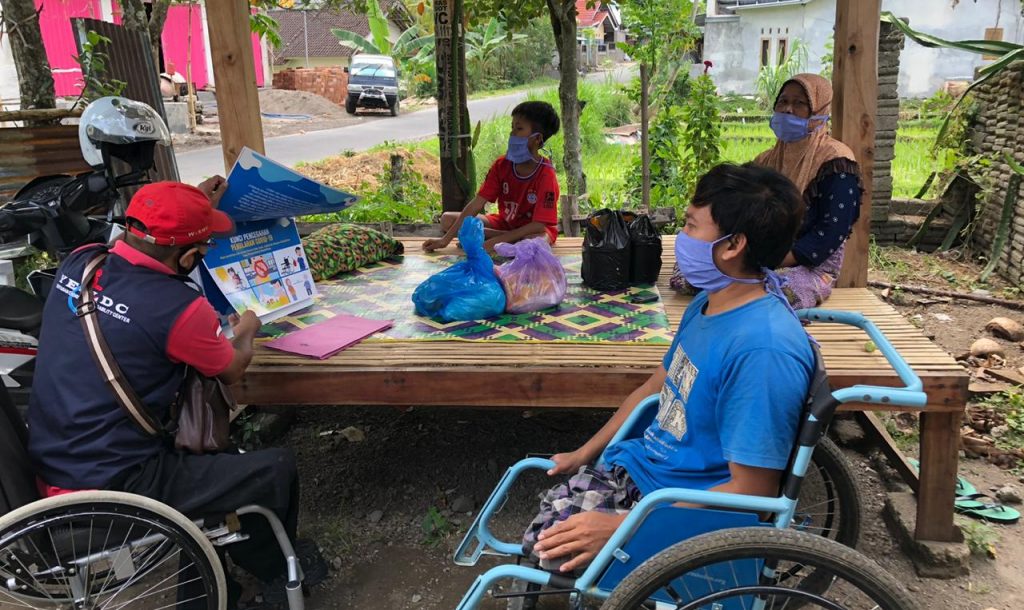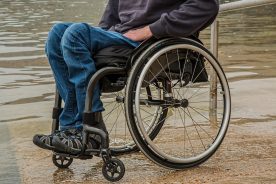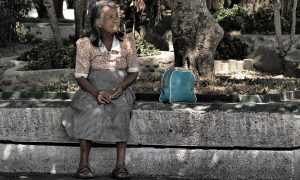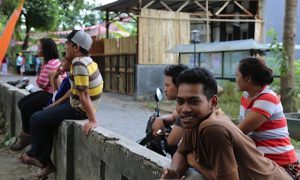The UN Special Rapporteur on the rights of persons with disabilities, Catalina Devandas, argued that “little has been done to provide people with disabilities with the guidance and support needed to protect them during the ongoing COVID-19 pandemic, even though many of them are part of the high-risk group.” People with disabilities in Indonesia have also expressed concerns regarding their vulnerability to the disease and the barriers to required services during the pandemic.
Disability and the worldwide COVID-19 outbreak: creeping ableism?
Some people with disabilities are concerned with public information services that are drafted with only able-bodied people in mind as the audience. For instance, a community of Indonesian deaf and hearing-impaired people wrote an open letter to President Joko Widodo demanding that all government press conferences related to COVID-19 provide an Indonesian sign language interpreter. There was also a concern among those who are deaf-blind as to how they would communicate with the outside world during the pandemic and abide by requirements for physical distancing and avoiding touching.
Other people with disabilities voiced their concern that disabled and chronically ill people will be intentionally given the lowest priority for medical care, and allowed to die of COVID-19 due to their pre-existing disability or chronic illnesses. Recently several children with multiple disabilities from a special development school were denied entry to an emergency hospital for COVID-19 in Jakarta. The refusal was made because the hospital did not have special staff that could provide care and assistance during isolation at the hospital for the disabled children. A deaf woman who tested positive for COVID-19 in Solo also faced difficulties, with the local Department of Health unable to communicate with her in tracing and identifying her travel history and previous contacts. And another disabled COVID-19 patient in Makassar, who was declared to have recovered from the disease, was refused entry to her community by her neighbours for fear that she might still have the disease.
People with mental illness living in forced institutional care are also considered a high-risk group. Many people with severe mental illness are forced to live in crowded institutional settings where it is impossible to observe social distancing. These people are denied access to important public information. They are not allowed to possess mobile phones, and the institutions where they reside do not make internet, televisions and print media available to them because the institutions do not consider people with mental illness as capable of thinking. These mental institutions also lack disinfectants and basic sanitation supplies, and there are no safety measures taken by staff to prevent the possible spread of the infection from the outside.
Such cases suggest that, in the midst of the pandemic, the so-called special needs of people with disabilities might be seen as too much trouble, too much of a burden, or too difficult a problem to be worth the effort. This may as well indicate an ideology of ableism that the pandemic has unearthed and strengthened, a belief that justifies denying care and equipment for COVID-19 to people with certain pre-existing conditions such as the disabled, chronically ill, elderly and weaker people in favour of those with a higher likeliness of recovery—”when an us-or-them choice” arises. Ableism may also constitute a judgment about a person’s ability to contribute to society and the value that society places on them. Those deemed less likely to contribute have a lower value and thus may face discrimination when receiving medical treatment in a critical situation. However, Indonesian difabel activism (difablism) has proven that people with disabilities are resourceful members of society who contribute to the fight against the pandemic through their various collaborative actions.
Indonesian difabel activism: collaborative actions against the pandemic

HWDI Padang donating food to disabled households. Photo by HWDI Padang, all rights reserved.
In critical or emergency situations, governments and aid organisations tend to view marginal groups, including people with disabilities, as objects of aid and assistance. However, many Indonesian people with disabilities—some prefer calling themselves difabel, or differently abled—challenge their role as mere objects or targets of government programs and demand an active involvement in the emergency response. In response to COVID-19, Indonesian difabel activists have taken their own initiative to help the government mitigate both short and long-term impacts of the pandemic on people with disabilities.
Some local Disabled People’s Organisations (DPOs) raised money to help reduce the economic impact of the pandemic on the community’s most vulnerable groups. For example, Sehati of Sukoharjo raised funds to donate basic daily supplies and disinfectant to elderly people, disabled people living in poverty and other vulnerable groups and also set up a COVID-19 information centre. Lembaga Penyandang Disabilitas (LPPDS) of Sumbawa supported their members to make 3 layer-cloth face masks and have been able to supply 1,440 face masks to people of their region. Pergerakan Difabel untuk Kesejahteraan (PerDIK) of Makassar raised funds to donate basic daily supplies, face masks, gloves, hand sanitizers and other disinfectants to aged people with disabilities. The Lombok Disability Creative Centre (LDCC) raised awareness of people with disabilities and their families about the COVID-19 pandemic and how to avoid contracting the disease.
Himpunan Wanita Disabilitas Indonesia (Association of Women with Disabilities—HWDI) of Padang city raised funds from the city civil servants’ wives association and other women’s groups to donate infant formula, food and nappies to disabled households that have babies and toddlers. In addition to fund raising and donations, Indonesian DPOs have been actively conducting online educational campaigns for people with disabilities through various weekly webinars on the COVID-19 pandemic and how to avoid contracting the virus as well as other relevant topics.
Rapid assessment: an empowering concerted initiative
In addition to these efforts, a network of Indonesian national and local disability activists called Jaringan DPO Respon Covid Inklusif conducted a Rapid Assessment on the impacts of the COVID-19 pandemic on people with disabilities in Indonesia. This assessment aimed to map out disabled people’s responses, needs, issues and what people with disabilities can do to participate in the fight against the pandemic. The findings from the assessment will inform the advocacy work of Indonesian national and local DPOs to promote disability inclusion in the Indonesian government’s policies and programs to manage and mitigate the impacts of the pandemic.
The assessment started in early April and was completed in late May. About 1,683 people with disabilities from 32 provinces participated in the survey. The group of initiators behind the survey and their volunteers from each province helped participants who found it hard to access or fill out the online surveys. Participants who had no internet access were reached by phone interviews. The specific access needs of the participants with different types of disability were also addressed in the online survey, for example, by providing a sign language video and an easy read translation for each question. This rapid assessment was done completely voluntarily using resources from each of the involved DPOs. The design of research instruments, data collection, data analysis and the write-up were also done entirely by disability activists. All disability activists involved maintained continuous coordination and feedback discussions through regular online meetings and social media group discussions. They all worked actively in high spirits from home.
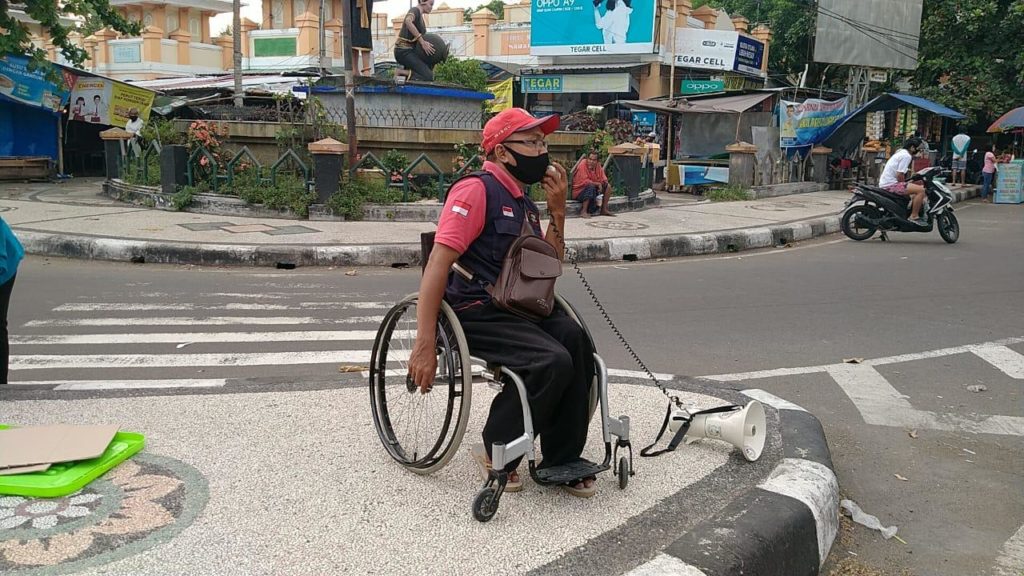
LDCC Lombok reminding people to keep physical distancE. Photo by LDCC, all rights reserved.
The assessment looks at various aspects of the social and economic impacts of the pandemic on people with disabilities in Indonesia. Specifically, the findings show the demographic spread of respondents, their knowledge about COVID-19, to what extent they can access information, and the social, economic and livelihoods impacts at both personal and household levels. The assessment also examines how online learning mechanisms during the pandemic affected children with disability. It demonstrates the role of disability activism and the contribution that people with disabilities make towards the collective efforts of managing and mitigating the effects of the pandemic.
Analysis of the findings indicates that people with disabilities face barriers in accessing educational information on the COVID-19 outbreak and the government’s social safety net programs. Most respondents so far have also experienced an 80-90 percent income reduction, either due to losing their jobs or losses in their small home-based businesses. This already shows that people with disabilities will need greater assistance from governments in coping with both short and long term social and economic impacts of the pandemic. About 70 percent of people with disabilities participating in the Assessment also expressed that they have contributed in various forms to fight against COVID-19 outbreaks in their regions.
To disseminate the findings, a series of webinars will be held with various stakeholders including several national government ministries and the national COVID-19 taskforce, DPOs, CSOs and INGOs. The final report of this Rapid Assessment will be used to pressure the Indonesian government to be more disability inclusive in their response to the pandemic and include social safety net programs for vulnerable groups, including people with disabilities. Local DPOs will be encouraged to lead regional advocacy work using this report to promote disability inclusion in provincial and district level COVID-19 mitigation programs and press for the participation of people with disabilities in provincial COVID-19 taskforces. Local DPOs can also use the report to develop awareness-raising materials and to strengthen disabled people’s capacity and resilience against the pandemic.
People with disabilities should not be left out of the COVID-19 response and mitigation strategies, because the effects of the pandemic hit them hardest. To provide greater protection for people with disabilities during the COVID-19 pandemic, governments need to consult with them to ensure disability inclusion in their policies. Through their difabel activism (difablism), Indonesian people with disabilities have proven that they are resourceful members of society who can make a contribution. People with disabilities can participate in flattening ‘the curve’ and building our resilience to fight our common enemy.
 Facebook
Facebook  Twitter
Twitter  Soundcloud
Soundcloud  Youtube
Youtube  Rss
Rss 